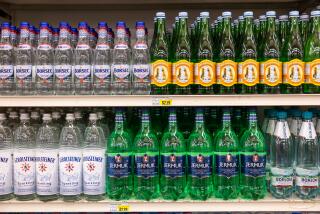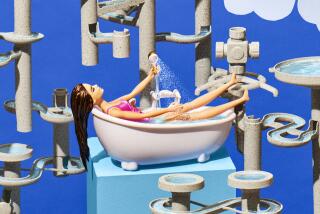Quelle Couleur! Quel Bouquet! Time to Judge the Tap Water
- Share via
First, observe the color. Clear? Good. Now swirl and sniff. Nothing unusual? Perfect. Now sip.
If the liquid feels light, nearly tasteless and leaves you thirsting for more, that’s high-quality tap water.
This weekend, water drawn from public taps in cities around the world will be put to the test by judges at the 11th Annual Berkeley Springs International Water Tasting in West Virginia.
The prize: bragging rights to the world’s best tap water.
The competition was started as a way to draw tourists to the small resort town known for its freshwater spring where George Washington bathed. But it has since grown into an international event that helped inspire the United Nations to declare 2003 the International Year of Freshwater, focusing attention on the need for safe drinking water.
One-sixth of the world’s population lacks clean drinking water, the very thing the competition celebrates.
At the competition this weekend, a series of seminars will focus on international water accessibility, on the sustainability of human health and balanced ecosystems and on the importance of research into conservation. Officials from the United Nations, National Science Foundation, World Water Rescue Foundation and several nations plan to participate.
“The bottom line is the fun we have with the entire thing, but it’s hard for it to not become serious in the time we’re living in,” said the event’s producer, J.W. Rone. “Water is a huge issue that we take for granted in the United States.”
Berkeley Springs, about 100 miles west of Washington, D.C., grew around the warm, mineral-rich water that flows from the ground at 74.3 degrees. Today, it is home to spas, inns and the Berkeley Springs International Water Tasting contest.
Nine nations, 26 states and the District of Columbia are expected to compete Saturday for the titles of best-tasting municipal water, bottled water, sparkling water or purified drinking water.
California has the most entries, largely because of its track record. Yucca Valley, Desert Hot Springs and the Metropolitan Water District of Southern California have won the municipal category in past years and Calistoga Sparkling Water holds competition honors among sparkling waters.
“The reality is that bragging rights are something that people are always looking for, whatever field they’re in,” Rone said. “They want to say ‘We’re the best.’ ”
Yucca Valley’s water was voted most drinkable last year. Other previous winners in the municipal category include two-time champion Charleston, W.Va., and three-time winner Atlantic City, N.J. All three are competing again this year.
In the storeroom at the Coolfont Resort in Berkeley Springs, the boxes of bottled water from across the nation and around the world are piling up, including wooden crates from Moldavia and cardboard containers of bottled water from Sweden.
So what makes one water better that another?
Experts say potassium makes water sweeter, calcium and magnesium give it fullness and storage in glass is better than plastic because it prevents the water from absorbing odors or taste. Ideally, no particular flavor should overpower the palate.
Some municipal water systems use as many as 30 chemicals to clarify, treat and flavor their water, but they tend not to fare as well in competition.
Arthur von Wiesenberger, the water expert and author who oversees the final judging, calls Saturday’s competition the “granddaddy of water tastings.”
This year’s judges include food writers, journalists and tourism officials. Von Wiesenberger will train them in water tasting techniques similar to those used by professional wine tasters.
More to Read
Sign up for The Wild
We’ll help you find the best places to hike, bike and run, as well as the perfect silent spots for meditation and yoga.
You may occasionally receive promotional content from the Los Angeles Times.






